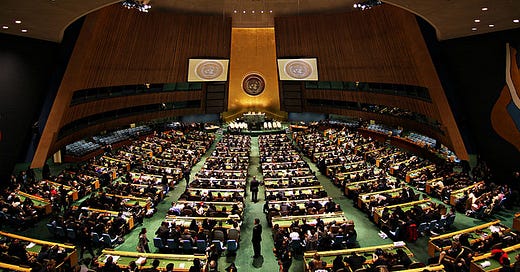How US Hegemony Should End
In a world dominated by democracies, American hegemonism should not be decided by its military might, but submitted to a vote in the UN General Assembly.
In a normal world, Europeans should not have to care about the outcome of the US presidential election, debating night after night who the new president will be, what foreign or domestic policy he will adopt, and so on.
Unfortunately, we have been living in a globalised world for 30 years and we are at the mercy of an economic and military power - the US - which, however, is extra-European and full of hubris. America has installed itself "at the head of the table", dictating the foreign and even domestic policies of its European allies, trying to split the continent again, to pit Europeans against Russia and China, putting them at a massive disadvantage economically and in terms continental security .
Why does the US do this? In order to turn EU states into captive markets for US arms sales and to monopolise the European oil & gas market -especially gas- for America’s LNG suppliers.
An even more pertinent question is: why don’t European politicians distance themselves from the US? Instead, they seem to passively participate in American strategies that can ruin their economies and seriously endanger their security. Already, the German economy - the engine of the EU - has stalled, and that translates into bad news for all.
I confess I have no logical or rational answer to the above question. Instead, I am convinced that regardless of who will be elected president of the US in the fall, the nightmare situation that Europe is going through today will not change for the better, at least not this decade.
On a more global scale, it has become imperative that the US’s claim to be the world’s sole hegemon should be democratically submitted to a vote by 193 sovereign states that make up the United Nations. After all, the US is currently engaged in a worldwide crusade for the promotion of freedom and democracy. It is therefore only fitting and right that America’s 30-year old claim to global leadership be tested by a free and democratic vote in the UN General Assembly.
The circumstances have altered quite significantly since the implosion of the USSR and the adoption by Washington of Wolfowitz’s global domination agenda. In this day and age no superpower, regardless of how powerful it might be, should be allowed to lord over global international affairs and impose a set of rules which favour it almost exclusively.
The choice to be put to the members of the UN General Assembly should be between American unipolarity versus multipolarity. If the UN members decide that the current state of affairs -with the US as the sole hegemon- is still appropriate in the conduct of international affairs, then the position to which Washington appointed itself in the 90’s should be maintained.
In case, however, a majority of UN members decide to replace US sole leadership with a multipolar arrangement, then Washington should undertake to abide by such a ruling.
Again, I confess that I am not at all hopeful that American political leaders have the necessary decency to call for such a vote, however fair and democratic such a solution might be.
At any rate, the main focus of the world’s attention should not be on the outcome of the 2024 presidential elections in the USA, but on trying to find a resolution to the thorny issue of American hegemonism and its negative implications for world peace.


